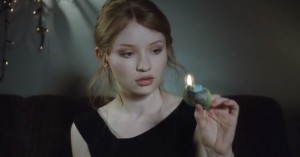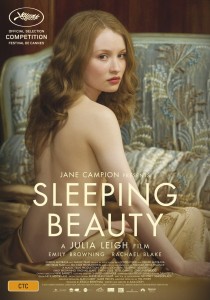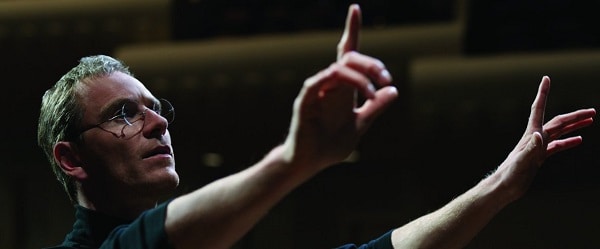Directed by Julia Leigh
Screenplay by Julia Leigh
2011, Autralia
Title and synopsis of Julia Leigh’s directorial debut suggests it to be an intriguingly dark and twisted version of the most well known and in film most frequently used fairy tale. What‘s left of the original tale is sleeping beauty and a very aged and perverted version of the prince – or to be precise princes, who definitely have not come to save her, not that saving is what the princess seeks. No romanticism, no white knights and certainly no happy ending. While retelling the fairy tale in its classic way would feel like mockery in the light of today‘s society, the film feels like it is not fully achieving to be disturbing in the right kind of way. The film‘s story develops around Lucy (Emily Browning). She is a stunningly gorgeous math student who struggles to support herself through university. Her regular jobs (cleaning at a café, testing stomach balloons and working the copy machine at an office) don‘t pay enough for her to manage rent and living; so she takes on a rather dubious profession. What starts off as comparably innocent waitressing in lingerie turns into a drugged Lucy performing as sleeping beauty while older men get to do anything, but penetrate her, for pay. Sleeping beauty then awakes completely in the dark of what has happened to her, to go back to passionless life. Some have argued that the film offers an overwhelmingly clinical analysis of the question of power and powerlessness; others have praised the character of Lucy for its ambiguity and complex blankness. But while it’s lacking commentary for a proper analysis, it is really rather difficult to find ambiguity in a blank surface. It is true  that the stark coldness of the film finds vulnerability in an unlikely place, as the aged men paying for Lucy‘s sleeping beauty, strip bare and reveal some of their most secret desires; the film mainly serves what this society obviously still is not fed up with numb beauty without much to say. Though Leigh’s film attempts to convey deep emotion it is unable to escape its clichéd narrative. It is without doubt that Leigh’s portrayal of dark sexual desires of rich older men is provoking, bold even at first glance, but safe on the side of stereotypes on second view. Ultimately these men’s vulnerability remains superficial as their actions carry out rather expected basic fears of an ideal image of masculinity. While the first one only wants to cuddle, the second man spends his time insulting “the stupid bitch“ and the third fails at carrying featherweight Lucy. Leigh has assembled the need to show your soft side, the urge to degrade women and establish ones own master-position (even if Lucy‘s knocked out) and the attempt of performing physical strength. Doesn‘t necessarily read like an overly surprising set of male character trades. The same goes for Lucy, who has of course – independent woman that she is – chosen her path, but fulfills the role of a blank, doll-like beauty, there to feed a men‘s ego and unconsciously take part in their fantasies.
that the stark coldness of the film finds vulnerability in an unlikely place, as the aged men paying for Lucy‘s sleeping beauty, strip bare and reveal some of their most secret desires; the film mainly serves what this society obviously still is not fed up with numb beauty without much to say. Though Leigh’s film attempts to convey deep emotion it is unable to escape its clichéd narrative. It is without doubt that Leigh’s portrayal of dark sexual desires of rich older men is provoking, bold even at first glance, but safe on the side of stereotypes on second view. Ultimately these men’s vulnerability remains superficial as their actions carry out rather expected basic fears of an ideal image of masculinity. While the first one only wants to cuddle, the second man spends his time insulting “the stupid bitch“ and the third fails at carrying featherweight Lucy. Leigh has assembled the need to show your soft side, the urge to degrade women and establish ones own master-position (even if Lucy‘s knocked out) and the attempt of performing physical strength. Doesn‘t necessarily read like an overly surprising set of male character trades. The same goes for Lucy, who has of course – independent woman that she is – chosen her path, but fulfills the role of a blank, doll-like beauty, there to feed a men‘s ego and unconsciously take part in their fantasies.
 Yes one could start examining the non-penetration during Lucy‘s sleep duties being juxtaposed with the penetration of her throat, earlier in the film, when a slick guy in a lab coat is putting a tube down her throat during the stomach balloon testing, but where does that really get us? And that is a question that remains until the end, where does this film take us? It merely dips into what society believes are dark sexual desires, the life of a stunning beauty whose motivation is somewhat blurry and almost completely absent everyday world. Lucy remains in her role of a canvas for male desire. While that is probably what her intended part is, it‘s certainly missing commentary. The most interesting relationship of the film – that of Lucy and Birdman (Ewen Leslie) — is terminated halfway through the film, after she successfully helps him to end his life. The film as a canvas simply remains too blank. It sticks to gender ideals where it could open up a discourse.
Yes one could start examining the non-penetration during Lucy‘s sleep duties being juxtaposed with the penetration of her throat, earlier in the film, when a slick guy in a lab coat is putting a tube down her throat during the stomach balloon testing, but where does that really get us? And that is a question that remains until the end, where does this film take us? It merely dips into what society believes are dark sexual desires, the life of a stunning beauty whose motivation is somewhat blurry and almost completely absent everyday world. Lucy remains in her role of a canvas for male desire. While that is probably what her intended part is, it‘s certainly missing commentary. The most interesting relationship of the film – that of Lucy and Birdman (Ewen Leslie) — is terminated halfway through the film, after she successfully helps him to end his life. The film as a canvas simply remains too blank. It sticks to gender ideals where it could open up a discourse.
In contrast to this potentially good idea failing to actually develop are the actors and the film‘s aesthetics. Leigh‘s visual concept and cast definitely take great responsibility for the attention this film has gotten. Camera, editing, cast and setting create a very harmonious though beautifully disturbing whole that the story fails to deliver.
take great responsibility for the attention this film has gotten. Camera, editing, cast and setting create a very harmonious though beautifully disturbing whole that the story fails to deliver.
– Merle Fisher



